Dear Friend,
If you think the content of this news letter is critical for the dignified living and survival of humanity and other species on earth, please forward it to your friends and spread the word. It's time for humanity to come together as one family! You can subscribe to our news letter here http://www.countercurrents.org/subscribe.htm. You can also follow us on twitter, http://twitter.com/countercurrents and on Facebook, http://www.facebook.com/countercurrents
In Solidarity
Binu Mathew
Editor
www.countercurrents.org
As The Health Of Hunger Striking Students In JNU Deteriorates,
The Administration Cuts Them Off From Civil Society
By Countercurrents.org
http://www.countercurrents.org/cc070516.htm
In an attempt to break the morale of hunger striking students of JNU the administration has blocked the entry of outsiders into the campus. A memo issued by Dr. Pramod Kumar, registrar of the university, threatens to evict outsiders from the campus. This memo comes at a time when JNU Teachers Association and the alumni are holding a relay hunger strike in the campus in solidarity with students who are on the 10th day of their indefinite hunger strike. A citizens' human chain also is planned at at 5 PM today. The students allege that there is no restriction in the entry of ABVP members, the student wing of the ruling BJP government, who are freely roaming the campus threatening the hunger striking students. It is presumed that it is to break the solidarity link between the students and the wider civil society that the JNU administration has issued this undemocratic memo
Alberta Wildfire Continues To Spread, Forcing Further Evacuations
By Roger Jordan
http://www.countercurrents.org/jordan070516.htm
The huge wildfire that has forced the evacuation of Fort McMurray—the northern Alberta city that is the hub of Canada’s tar-sands oil industry—continued to rage uncontrollably. Already late Wednesday, authorities were forced to widen the evacuation zone to include three communities south of Fort McMurray: Anzac, Fort McMurray First Nation, and Gregoire Lake Estates. Among those uprooted by the latest evacuation order were approximately one thousand Fort McMurray evacuees who were being temporarily housed at a camp in Anzac
After A Century In Decline, Black Farmers Are Back And On the Rise
By Leah Penniman
http://www.countercurrents.org/penniman070516.htm
These Black farmers don’t stop at healthy food. They’re healing trauma, instilling collective values, and changing the way their communities think about the land
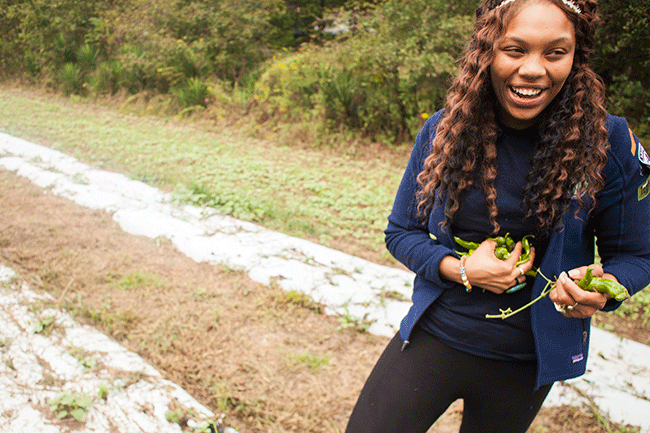
A few years ago, while clearing dried broccoli stalks from the tired soil of our land at Soul Fire Farm in upstate New York, I received a cold call from Boston. On the other end was a Black woman, unknown to me, who wanted to share her story of trying to make it as a farmer.
Through tears, she explained the discrimination and obstacles she faced in a training program she’d joined, as well as in gaining access to land and credit. She wondered whether Black farming was destined for extinction. She said she wanted to hear the voice of another African-heritage farmer so that she could believe “it was possible” and sustain hope.
The challenges she encountered are not new. For decades, the U.S. Department of Agriculture discriminated against Black farmers,excluding them from farm loans and assistance. Meanwhile, racist violence in the South targeted land-owning Black farmers, whose very existence threatened the sharecropping system. These factors led to the loss of about 14 million acres of Black-owned rural land—an area nearly the size of West Virginia.
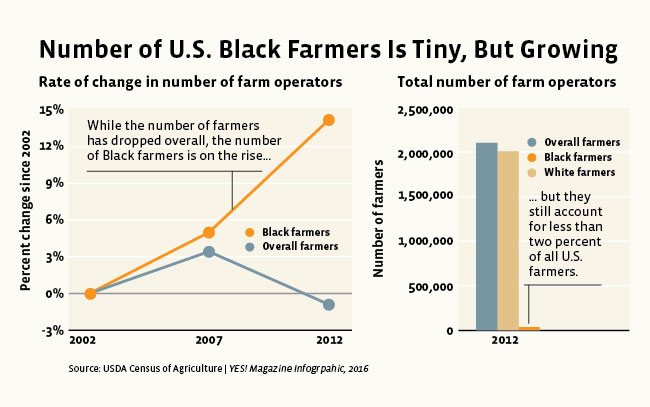
Infographic by YES! Magazine 2016
In 1982, the U.S. Commission on Civil Rights extrapolated the statistics on land loss and predicted the extinction of the Black farmer by the year 2000.
They were wrong. While the situation is still dire, with Black farmers comprising only about 1 percent of the industry, we have not disappeared. After more than a century of decline, the number of Black farmers is on the rise.
These farmers are not just growing food, either. The ones you’ll meet here rely on survival strategies inherited from their ancestors, such as collectivism and commitment to social change. They infuse popular education, activism, and collective ownership into their work.
And about that woman who called me from Boston? Years after we first spoke, I called her back. Turns out, she is still at it.
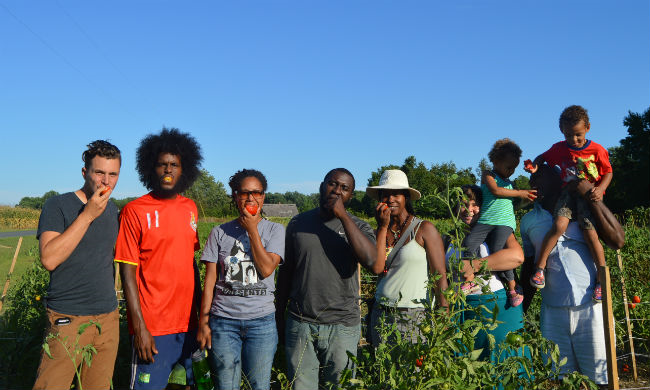
Blain Snipstal, second from left, with members of the Black Dirt Farm Collective.
Photo courtesy Blain Snipstal.
Photo courtesy Blain Snipstal.
Blain Snipstal and Aleya Fraser
Farm: Black Dirt Farm Collective
Location: Preston, Maryland
Number of Years Farming: 7
Revered Elder: Harriet Tubman
Farm: Black Dirt Farm Collective
Location: Preston, Maryland
Number of Years Farming: 7
Revered Elder: Harriet Tubman
About 80 miles southeast of Baltimore, Black Dirt leases 2 acres that long have been home to the Black freedom struggle. Harriet Tubman once rescued her parents and nine other people from enslavement in this place, which was one of the first stops on the Underground Railroad.
The 10 farming-collective members who work here today revere Tubman’s example and work to continue her legacy of revolutionary social change. In addition to growing natural food for markets in D.C., Baltimore, and Philadelphia, they host hundreds of people each year for activist training programs. They continue the farming practices of their ancestors, such as “going through together,” a southern Black practice of working collectively in neighbors’ plots and sharing the harvest. They are also part of the North Carolina-based Seed Keepers Collective, and focus on preserving seeds of the African diaspora, including millet, sorghum, cotton, and sweet potatoes.
“It’s like jazz music in a sense,” Snipstal explains, referring to Black Dirt’s collaborations with like-minded farmers around the country. “We are always riffing off each other, even if we don’t tell one another.”
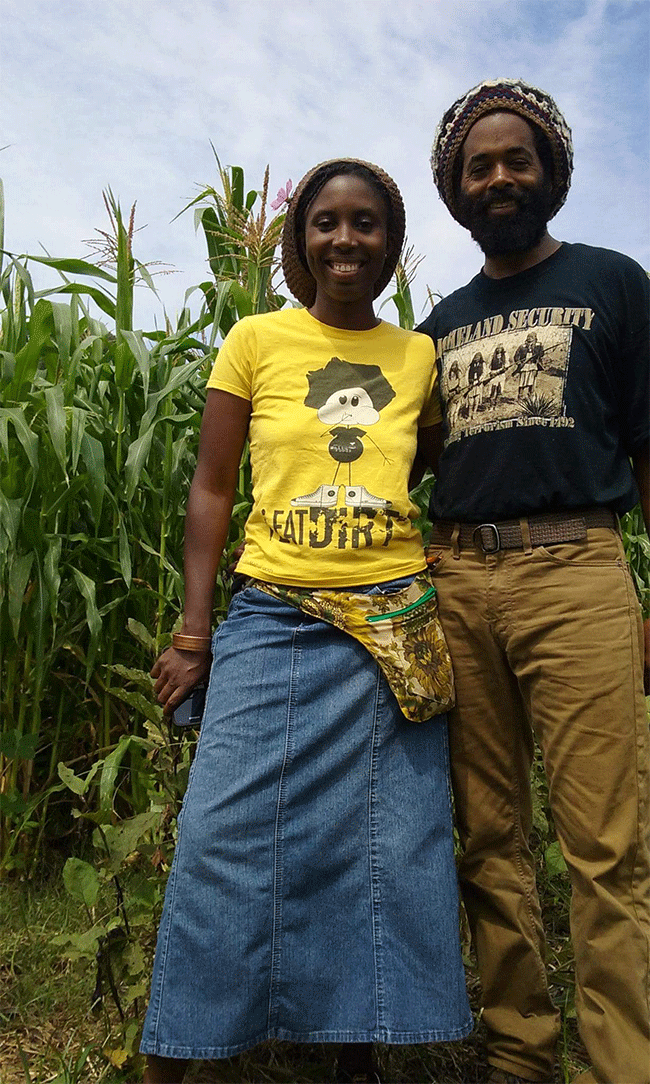
Vegan farmers JoVonna Johnson-Cooke and Eugene Cooke raise corn and other native crops
at their Stone Mountain farm. Photo by Nicole Bluh.
at their Stone Mountain farm. Photo by Nicole Bluh.
Eugene Cooke and JoVanna Johnson-Cooke
Farm: Grow Where You Are Collective
Location: Atlanta and Stone Mountain, Georgia
Number of Years Farming: 14
Revered Elder: Wangari Maathai
Farm: Grow Where You Are Collective
Location: Atlanta and Stone Mountain, Georgia
Number of Years Farming: 14
Revered Elder: Wangari Maathai
Collaboration is also key for the nine members of the Grow Where You Are collective, who operate a 3-acre farm and food forest in Atlanta, as well as a 5-acre farm in the nearby rural community of Stone Mountain.
Here, some of the most important collaborators are churches. Local churches own two-thirds of the group’s urban farmland; their members and food pantries receive a portion of the produce. The collective is vegan, and members use no animal products in their cultivation of fruits, vegetables, and nuts.
Since 2009, Grow Where You Are members have trained more than 100 urban farmers and helped start 18 urban farms, 14 school gardens, and 40 home gardens. They also prepare free vegan feasts for the local community, where neighbors gather for to learn about health, make new friends, and even practice capoeira—an Afro-Brazilian martial art form that brings together elements of dance and acrobatics. Founder Eugene Cook says these events show “what a sovereign community can feel and be like.”
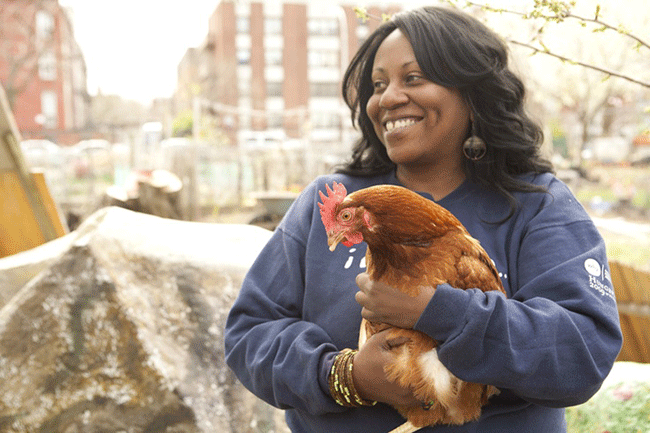
Yonnette Fleming holds a Rhode Island Red hen at the Hattie Carthan Community Garden.
Photo by Quincy Ledbetter.
Photo by Quincy Ledbetter.
Yonnette Fleming
Farm: Hattie Carthan Herban Farm
Location: Brooklyn, New York
Number of Years Farming: 16
Revered Elder: Hattie Carthan
Farm: Hattie Carthan Herban Farm
Location: Brooklyn, New York
Number of Years Farming: 16
Revered Elder: Hattie Carthan
Yonette Fleming’s passion for agriculture comes through in the poetic urgency of her words. So it’s surprising to learn she once tried to escape it. She was raised in Guyana, where her family cooperated with indigenous communities to grow coconuts, sugar, rice, and other crops. She took a detour into corporate America before finding her way back to the land.
“I came to the earth with an open heart and said, ‘Teach me, mold me, shape me, inform me with a new intelligence,’” explains Farmer Yon, as her friends call her. She went on to join the Hattie Carthan Community Garden and founded its first farmers market.
For Fleming, farm work is an essential part of healing from the trauma of racism. Among her Brooklyn neighbors she found Black elders who had worked as sharecroppers, as well as young people who’d never set foot on a farm and told her they wanted nothing to do with dirt. She brought the two groups together in a series of monthly storytelling circles in the garden, which built connections between the generations and addressed the young people’s aversion to the land. Students who participated went on to create several discussion and action groups in their schools to address food sovereignty—that is, the right of all people to have a say in the food system. One of them got his food-safety license and is opening a restaurant.
Fleming is also a trained priestess and uses the land as a source of healing for women. After learning that almost one-quarter of women in the United States take antidepressants, she created healing rituals that incorporate drumming, farm-grown herbal medicine, ancestor reverence, building of traditional clay ovens, and artisanal bread baking.

Lindsey Lunsford gathers peppers at TULIP’s community garden. Photo by Wil Sands.
Lindsey Lunsford
Farm: Tuskegee United Leadership and Innovation Program (TULIP)
Location: Tuskegee, Alabama
Number of Years Farming: 2
Revered Elder: Booker T. Washington
Farm: Tuskegee United Leadership and Innovation Program (TULIP)
Location: Tuskegee, Alabama
Number of Years Farming: 2
Revered Elder: Booker T. Washington
The educator and activist Booker T. Washington once sent a letter to every resident of Tuskegee’s Greenwood neighborhood, encouraging them to grow home gardens in order to build self-sufficiency. Through her work with TULIP, Lindsey Lunsford is continuing his legacy.
On the program’s half-acre community garden, members grow traditional African-American crops such as okra, corn, squash, watermelon, eggplants, cucumber, tomatoes, peppers, and a special variety of purple sweet potato bred by George Washington Carver, a renowned Black agriculturalist. They supply three local grocery stores and two restaurants, and train their neighbors to start their own home gardens.
Lunsford is just getting started as a farmer, but her vision of a healthier community keeps her motivated. “We have a 24-hour McDonald’s, but we don’t have a 24-hour health care facility,” she explains.
When young people come to work in the garden, she starts off by asking them to draw a picture of Tuskegee, where more than 28 percent of the population lives below the poverty line. Many draw scenes of violence, she says, often with the McDonald’s restaurant at the center of the image. “That’s what we are working to change.”

Chris Bolden-Newsome shows off a basket of marshmallow root he grew at Bantram’s Garden.
Photo by Owen Taylor.
Photo by Owen Taylor.
Chris Bolden-Newsome
Farm: Community Farm and Food Resource Center at Bantram’s Garden (a project of the University of Pennsylvania’s Agatston Urban Nutrition Initiative)
Location: Philadelphia, Pennsylvania
Number of Years Farming: 12
Revered Elders: Rufus and Demalda Newsome (his parents)
Farm: Community Farm and Food Resource Center at Bantram’s Garden (a project of the University of Pennsylvania’s Agatston Urban Nutrition Initiative)
Location: Philadelphia, Pennsylvania
Number of Years Farming: 12
Revered Elders: Rufus and Demalda Newsome (his parents)
Before the “food justice” movement existed in the United States, Black farmers in the Mississippi Delta were cooperating to feed the community. Raised by farmers in that movement, Chris Bolden-Newsome assumed that growing food was something everybody did and was shocked to find otherwise when he moved north. He now manages a 50-bed community garden in his current home of Philadelphia, where he reconnects Black people to their agricultural heritage.
Twelve teenagers are employed at the community farm each year, and Bolden-Newsome teaches them aspects of Black culture they may not have been exposed to, such as traditional recipes, seed keeping, liberation songs, and Southern farming techniques.
“Old people tell me they grew up with hatred of the South, and growing food reminded them of bad old days,” Bolden-Newsome explains. He believes the younger generation has picked up that hurt and resentment, but hopes that learning more about Black traditions will help to heal the trauma that separates them from the land.
“As Black farmers, we need to be more than just growers of food,” Bolden-Newsome says. “We have to be teachers of culture and healers of trauma. That is how we survive.”
Leah Penniman wrote this article for YES! Magazine. Leah is a farmer and educator based in the Albany, New York, area.
Why Obama Prioritizes Ousting Assad Over Defeating Syria’s Jihadists
By Eric Zuesse
http://www.countercurrents.org/zuesse070516.htm
The CIA has been aiming since at least 1957 to overthrow the Ba’ath Party as Syria’s leadership, and to replace them with a partitioned Syria, whose key oil-and-gas pipeline route would be controlled by a fundamentalist-Sunni ally of the Sauds
Fiasco In Lebanon: 60 Minutes, Privilege And Exploitation
By Dr. Binoy Kampmark
http://www.countercurrents.org/kampmark070516.htm
Spittle-flecked journalism is something of a curse, an enterprise that muddies the fine lines between chasing a story and creating it. And the Nine Network of Australia, with its own variant of 60 Minutes, is certainly of such inspiration, drawing its strength from the margins of investigative journalism and assuming a role in influencing events
Bombay High Court Expresses Helplessness; Can’t Protect The Homeless
By National Alliance of People’s Movements
http://www.countercurrents.org/napm070516.htm
The Bombay High Court in the matter of 13 days old girl child, resident of a slum at Yari Road, in its order has expressed helplessness to provide any relief to the homeless. The Court has also cited its limitation in its jurisdiction to provide any relief to the homeless people
When Experts Bat For India’s Productive Engagement In Myanmar
By Nava Thakuria
http://www.countercurrents.org/thakuria070516.htm
As Myanmar (formerly Burma) is opening up to the world, various Indian experts come forward advocating for New Delhi’s pro-active initiatives in this fast changing neighborhood. Recently concluded a discourse at Guwahati also witnessed the participants in large numbers supported New Delhi’s involvement in the process of sustainable development in the southeast Asian nation. Organized by Guwahati Press Club on 21 April, the session was energized by a Yangon (formerly Rangoon) based Assamese journalist and political analyst Bidhayak Das
No comments:
Post a Comment